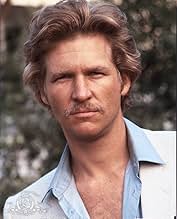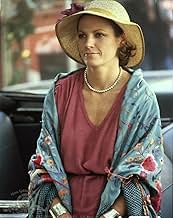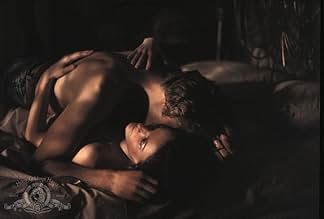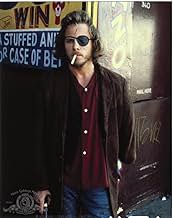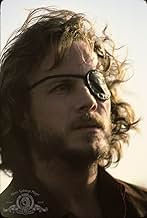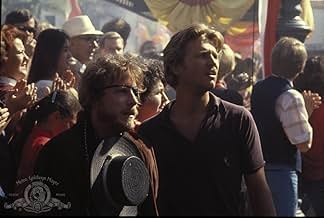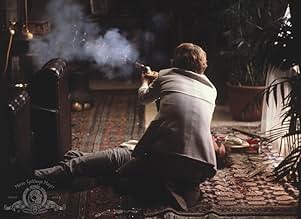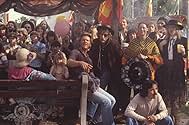NOTE IMDb
6,8/10
8,2 k
MA NOTE
Richard aperçoit un homme en train de se débarrasser d'un corps. Avec son ami Alex Cutter, il décide de dénoncer l'homme qu'il pense être coupable.Richard aperçoit un homme en train de se débarrasser d'un corps. Avec son ami Alex Cutter, il décide de dénoncer l'homme qu'il pense être coupable.Richard aperçoit un homme en train de se débarrasser d'un corps. Avec son ami Alex Cutter, il décide de dénoncer l'homme qu'il pense être coupable.
- Réalisation
- Scénario
- Casting principal
- Récompenses
- 2 victoires et 2 nominations au total
Francis X. McCarthy
- Toyota Man
- (as Frank McCarthy)
Avis à la une
John Heard has got back from the war (it's not clearly said, but it's obvious it's Vietnam) with a patch on his eye and minus a leg and a hand. He's p-i-s-s-e-d off on the whole world, drinks a lot, and so does his wife. Jeff Bridges is a friend of both of them. He is a witness to a murder right in the beginning of the movie (so pay attention). John, with the deceased girl's sister thinks he knows how to nail who he thinks did it. Jeff doesn't really want to take part in it, you really don't want to see this movie. NOTHING happens. And they try to add a complication near the end, involving a history of a guy we hardly know... I'm sure it's a bad adaptation from the book, I hope so.
Alex Cutter (John Heard) is a drunken disabled war veteran. His wife Mo (Lisa Eichorn) is also a drunken mess. Their best friend Richard Bone (Jeff Bridges) is a witness to a murder, and he thinks that the killer is this powerful oil tycoon JJ Cord (Stephen Elliott). Cutter refuses to let it go, and together with the victim's sister Valerie Duran (Ann Dusenberry) harasses Bone to get JJ.
The main drawback is that their plan was never going to work. If they really thought about it, they would see it as a fool's errand. The plan actually insulates JJ from any testimony from Bone. The plan actually helps JJ.
However we know Cutter is a drunk bastard. So I'm willing to believe that he would come up with a poorly constructed plan. It's the acting that is so superior in this. John Heard really goes all out, and Jeff Bridges' calmness makes them the perfect duo. I just love how crazy John Heard gets. He really shines.
The main drawback is that their plan was never going to work. If they really thought about it, they would see it as a fool's errand. The plan actually insulates JJ from any testimony from Bone. The plan actually helps JJ.
However we know Cutter is a drunk bastard. So I'm willing to believe that he would come up with a poorly constructed plan. It's the acting that is so superior in this. John Heard really goes all out, and Jeff Bridges' calmness makes them the perfect duo. I just love how crazy John Heard gets. He really shines.
This is an excellent movie and one of the most consistently underrated. John Heard has never been better, and he is (alongside the late J.T. Walsh) amongst the most under-appreciated actors ever (one of the few mistakes in 'The Sopranos' was to let him go). However, Jeff Bridges yet again proves his credentials by turning in a beautifully nuanced performance as an unattractive, self-absorbed failed playboy in counterpoint to Heard's righteous crippled Vietnam veteran.
This is a companion piece to 'Chinatown' in its study of corrupt power structures, but is more intimate and believable (and 'Chinatown' is superb). We still wait for its recent equal in the noir stakes.
This is a companion piece to 'Chinatown' in its study of corrupt power structures, but is more intimate and believable (and 'Chinatown' is superb). We still wait for its recent equal in the noir stakes.
Cutter's Way cannot be overpraised. This movie is a masterpiece of the first order. Ivan Passer, a compatriot of Milos Forman, came to the USA as an experienced Czech movie director. Not unlike Alfred Hitchcock or some German directors 30 years before him, he seems to have made a thorough analysis of the American social conditions and general manners. He then transformed his findings into movies. Two of them I know deal with New York. They are appropriately gritty. The setting of Cutter's way is a Californian beach community for the rich and beautiful and the movie is appropriately glossy. The whole story takes place in those paradisiac locales. They are presented like an enchanted kingdom, a country of its own.
Under the glossy surface, there is a darker side to the place. There is prostitution, drug abuse and murder. Cutter, living on the fringes of the enchanted kingdom, sees that more clearly than everyone else. He has his own code of chivalry by which he wants to live. He develops conspirational theories and strains to convert them into hard facts. The world around him, populated by indifferent, amoral rich and beautiful people, does not understand him, does not even want to listen, laughs at him. So Cutter mounts a white stallion and rides a charge.
Repeatedly the film slips into surrealistic situations, in which the impression made on the viewers is more relevant than the storyline. This technique was well known in the forties (e.g. in film noir), present day audience are less used to it. In the earlier days of film making, surrealism was created on a soundstage, and the change between reality and "dream" became immediately clear. Passer uses real locations for situations removed from reality a daring experiment that rewards the viewers with hauntingly beautiful pictures but might also confuse many. The director took this risk and we are rewarded with a magnificent picture about a distinguished slice of America. I predict: Cutters way will one day become an honored classic.
Under the glossy surface, there is a darker side to the place. There is prostitution, drug abuse and murder. Cutter, living on the fringes of the enchanted kingdom, sees that more clearly than everyone else. He has his own code of chivalry by which he wants to live. He develops conspirational theories and strains to convert them into hard facts. The world around him, populated by indifferent, amoral rich and beautiful people, does not understand him, does not even want to listen, laughs at him. So Cutter mounts a white stallion and rides a charge.
Repeatedly the film slips into surrealistic situations, in which the impression made on the viewers is more relevant than the storyline. This technique was well known in the forties (e.g. in film noir), present day audience are less used to it. In the earlier days of film making, surrealism was created on a soundstage, and the change between reality and "dream" became immediately clear. Passer uses real locations for situations removed from reality a daring experiment that rewards the viewers with hauntingly beautiful pictures but might also confuse many. The director took this risk and we are rewarded with a magnificent picture about a distinguished slice of America. I predict: Cutters way will one day become an honored classic.
Ostensibly this film appears to be a buddy movie from the 1980s, but it is actually something much more interesting. Employing standard Hollywood clinches with its thriller/ investigation narrative and many of of its "stock" characters and situations, the little guys - Heard and Bridges - take on Mr Fat Cat Capitalist who rules the peacetime world like an untouchable and corrupt monarch. The film, though well-executed and enjoyable, at first seems no more than a well-scripted, well-acted (Heard is particularly good as the embittered, crippled Vietnam Veteran) genre piece. However, what emerges by the end is something far more exciting and radical - an indictment of US politics and power relations, and a genuinely bleak reflection on the impossibility and rarity of real justice both at the micro and macro levels.
Vietnam and its true significance is used to great effect in the film, as is the interplay between the two buddies. Whilst Bridges won't accept that he has witnessed the ultimate, bleak truth of US power relations until the film's abrupt, punchy end, Heard knows the truth intuitively and automatically because he understands and hates the world from the the start. He has given up on notions such as forgiveness and even the need for legal process, and seeks only revenge on the rich and the powerful. He understands, correctly, that is the only way a kind of momentary justice is possible, since everything else is either controlled by the elites or made to protect them. Without wishing to spoil the film's brilliant final moments, it is here that the whodunnit story is stripped away and the guilt they have been seeking to prove, as Richard Bone realises, becomes entirely political or metaphysical, and the the crime itself becomes irrelevant.
Vietnam and its true significance is used to great effect in the film, as is the interplay between the two buddies. Whilst Bridges won't accept that he has witnessed the ultimate, bleak truth of US power relations until the film's abrupt, punchy end, Heard knows the truth intuitively and automatically because he understands and hates the world from the the start. He has given up on notions such as forgiveness and even the need for legal process, and seeks only revenge on the rich and the powerful. He understands, correctly, that is the only way a kind of momentary justice is possible, since everything else is either controlled by the elites or made to protect them. Without wishing to spoil the film's brilliant final moments, it is here that the whodunnit story is stripped away and the guilt they have been seeking to prove, as Richard Bone realises, becomes entirely political or metaphysical, and the the crime itself becomes irrelevant.
Le saviez-vous
- AnecdotesBefore production started on this film, Ivan Passer and producer Paul R. Gurian went to Jeff Bridges' house to ask him if he would agree to play Bone. After both entered Bridges' property, the actor's dog, a big German shepherd, attacked Gurian, biting him on the jaw. Gurian nearly died. Bridges later confessed that, after this incident, he had no choice but to accept the role in order to avoid being sued for several million dollars.
- GaffesValerie's disappearance is neither explained nor noted by the main characters.
- Citations
Alex Cutter: I don't drink. You know, the routine grind drives me to drink. Tragedy, I take straight.
Meilleurs choix
Connectez-vous pour évaluer et suivre la liste de favoris afin de recevoir des recommandations personnalisées
- How long is Cutter's Way?Alimenté par Alexa
Détails
- Date de sortie
- Pays d’origine
- Langues
- Aussi connu sous le nom de
- Cutter's Way
- Lieux de tournage
- 800 Alvarado Place, Santa Barbara, Californie, États-Unis(El Encanto Hotel scenes.)
- Société de production
- Voir plus de crédits d'entreprise sur IMDbPro
Box-office
- Budget
- 3 000 000 $US (estimé)
- Montant brut aux États-Unis et au Canada
- 1 729 274 $US
- Montant brut mondial
- 1 752 634 $US
Contribuer à cette page
Suggérer une modification ou ajouter du contenu manquant

Lacune principale
By what name was La blessure (1981) officially released in India in English?
Répondre

